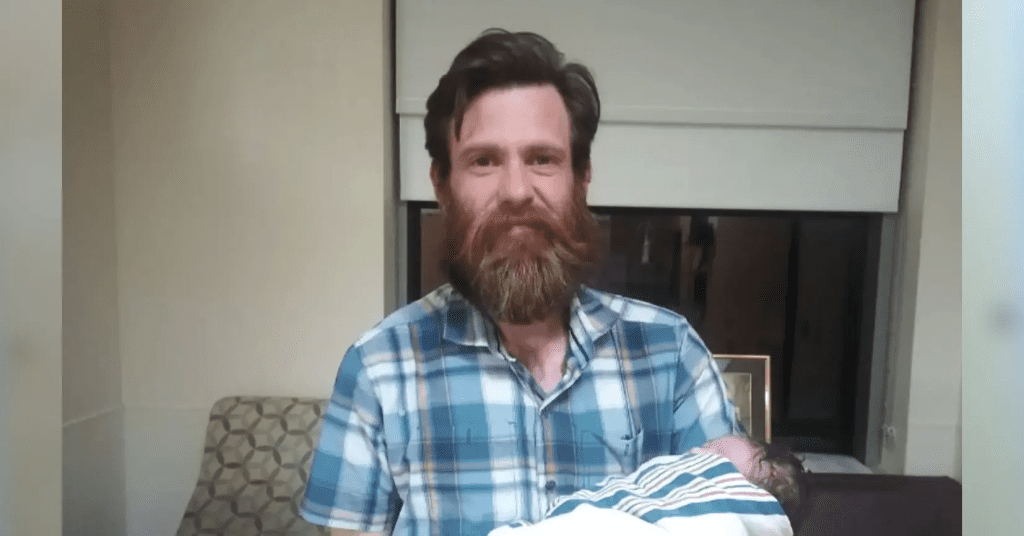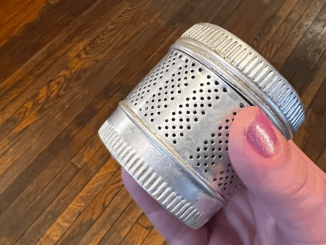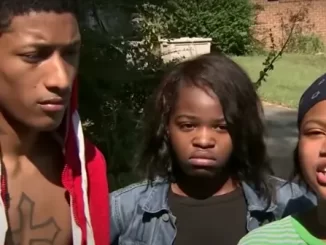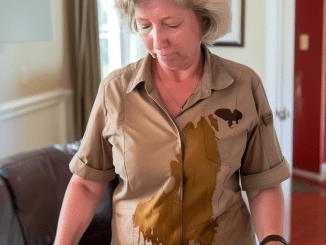In a move that has stirred widespread controversy, Bug Hall, the former child actor best known for his role as Alfalfa in The Little Rascals (1994), has come under fire for a series of social media posts regarding the birth of his fifth child. Hall’s comments, where he referred to his son as his “heir” and his daughters as “dishwashers,” have ignited outrage, with many calling his remarks demeaning and sexist.

Bug Hall sparked backlash on X for his “disgusting” comment about his daughters. Credit: Paul Archuleta / Getty
The Controversial Post
Bug Hall, now 39, took to social media platform X (formerly known as Twitter) to announce the birth of his fifth child, a son named Mark Athanasius Chad Anthony Hall-Barnett. In his post, Hall joyfully proclaimed, “I have an heir,” while sharing a series of photos of his newborn and wife, Jill Marie DeGroff, in the hospital.
Hall’s post began innocently enough, celebrating the arrival of his son:
“Mark Athanasius Chad Anthony Hall-Barnett of the Holy Cross was born at 4AM, weighing in at 9.5 lbs. Mama and baby are both doing great. My bride’s fifth delivery, third all natural.”
However, things took a turn when a social media user pointed out that Hall already has four daughters. Hall responded with a comment that many found offensive: “I said heir, not dishwasher.”
Public Outrage and Backlash
Hall’s comment quickly drew sharp criticism from users across the platform, many of whom found his words degrading to his daughters. One user lashed out, saying, “You’re disgusting. You’re publicly demeaning your daughters to try and generate rage bait clicks. It’s the behavior of a petulant, emasculated child, and I pray for all of your children.” Another criticized his sense of humor, stating, “Congratulations. You’re an awful person. Also, you’re not at all funny.”
The outrage didn’t stop there. Several others took to the platform to express concern for Hall’s daughters, with one user praying that his daughters would grow up and distance themselves from his “toxicity.” Others called for Hall to reevaluate his actions, describing his post as distasteful and harmful to the image of fatherhood.
Defending the Remarks
Despite the backlash, Hall appeared unshaken and continued to defend his comments. He responded to a user who suggested his wife should divorce him, saying, “I made the same joke to my wife while she was in labor. We both had a good laugh. Hard as it is for you to comprehend, most normal people are still rich in humor and joy. Stay miserable, curmudgeon.”
He further explained the reasoning behind his son’s hyphenated last name, writing, “I legally took my stepfather’s last name before I got married because I wanted to honor him by giving my family his name. He’s a great man who raised me from a toddler.” Hall’s decision to retain the hyphen in his professional name, he explained, was made to maintain continuity in his acting career, a move he says he doesn’t regret.
A Career in Reflection
This incident has prompted many to look back on Bug Hall’s career. Known primarily for his role as the mischievous Alfalfa in The Little Rascals, Hall enjoyed early fame as a child actor. He also starred in The Big Green (1995) and The Stupids (1996), solidifying his place as a 90s family film favorite. Hall later shifted to voice-over work, contributing to Disney’s animated Hercules, and made a return to the screen in projects like Harley and the Davidsons (2016), North Blvd (2018), and This is the Year (2020).
However, his public image took a hit in 2020 when Hall was arrested in Weatherford, Texas, after allegedly huffing air duster cans, according to reports from FOX News. His latest controversies have further alienated fans who once adored him as a child star.
I have an heir!
— 🇻🇦Bug Hall🌱 (@Bug_Hall) September 17, 2024
Mark Athanasius Chad Anthony Hall-Barnett of the Holy Cross was born at 4am, weighing in at 9.5 lbs. Mama and baby are both doing great. My bride's fifth delivery, third all natural 💪⚜️
Athanasius Contra Mundum pic.twitter.com/yr5mszz33p
The Broader Issue: Language and Gender Roles
At the heart of this controversy lies a broader conversation about gender roles and how language can shape perceptions of value within families. Hall’s comment about his daughters being “dishwashers” has struck a nerve, highlighting the long-standing cultural issue of assigning stereotypical roles to women and girls. Many critics have pointed out that such language reinforces harmful gender norms, reducing daughters to domestic roles while elevating sons to positions of importance or “heirs.”
The idea of a son being viewed as an “heir” is not uncommon in traditional, patriarchal societies, where sons are often seen as the bearers of the family name and legacy. However, in today’s more progressive world, where gender equality is increasingly embraced, Hall’s comments appear regressive to many.
A Misguided Joke or Something Deeper?
While some might defend Hall’s remarks as an attempt at humor, it’s clear that his words have touched on deep-rooted societal issues. Humor that plays into gender stereotypes is often dismissed as harmless, but it can also perpetuate negative attitudes toward women and reinforce outdated beliefs about gender roles within the family unit.
Hall’s dismissive responses to critics have only fueled the fire, leading many to question whether he truly understands the weight of his words. What was perhaps meant as a lighthearted joke has turned into a moment of reflection on how we view and speak about the roles of men and women in modern society.

Conclusion: The Impact of Words on Family and Society
Bug Hall’s recent comments have opened up a larger conversation about the power of language and the importance of how we view and treat all members of our families. While Hall may have intended his remark as a joke, the backlash reveals that such comments, especially in public forums, have lasting impacts. Words matter, and as society continues to push for greater gender equality, moments like this serve as reminders of the need for thoughtful and respectful communication.
As Hall navigates this wave of public criticism, one thing is clear: the world is watching how we speak about our sons and daughters, and the language we use can either uplift or undermine their inherent value.


